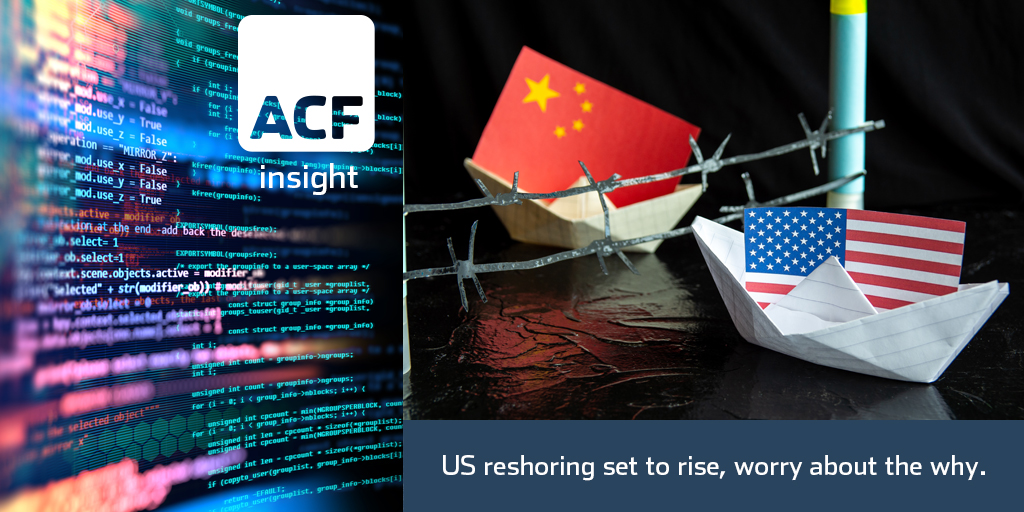US reshoring – finely balanced for now
What happened to US reshoring? Is the trend dead and are US manufacturers doomed?
Covid, Russia-Ukraine and China tensions have thrown an intense spotlight on supply chains (logistics) and US reshoring.
Couple US-Sino tensions and a focus on supply chain independence with a somewhat divisive political polarity in the US in which the democrats are having to move more towards Trumpism to win swing voters, and it seems fairly certain to us that reshoring is only going to rise over the next 5 years.
For example, the US has become very interested in redeveloping its own supply of antimony. Antimony is a strategic resource for a few reasons – the only serious player in the US is mining explorer and developer Perpetua Resources Nasdaq:(PPTA).
This junior miner has received various quanta of government related cash to push forward its projects. PPTA is also partnered to supply antimony for liquid metal batteries, which are used for long duration energy storage (LDES) projects by utilities and are an alternative to vanadium redox flow batteries (VRFBs).
As an investing aside, we believe there is space for many LDES technologies and solutions because of the dizzying scale of utility scale renewable electricity future demand and different use cases that will inevitably need to be satisfied.
If growing US China rivalry is driving reshoring, should investors be wary of this?
Hopefully, because of the intimate financial/economic ties between the US and China most of what we see for US/China rivalry is posturing and aimed at the international alliance audience and home market opinion.
If so, there is perhaps less to worry about than at first appears. However, this balance of power may evolve.
China appears to be attempting to sway the balance of power to the extent that the financial ties between the US and China will be complemented by a Chinese empire of ‘metals’ by which we mean resources (largely Africa and particularly East Africa).
If Chine were to achieve its imperial goals, it could tip the balance of power firmly in China’s favour and make it bold. The US (and the EU) is clearly aware of this risk. Logical responses from the US and EU would accelerate rising tensions with China.
However, on the brighter side this Chinese strategy is now running into headwinds in one or two places with client states attempting to disentangle themselves from Chinese capital and labour and getting a bit bolshy about it as part of the process.
For example, Uganda’s President Museveni declined to pay the bill for a rather expensive and fairly shoddily Chinese built (read also uncompleted) major highway in Uganda. China responded by reportedly sequestering Entebbe airport, but rapidly withdrew in the face of a stern response from Uganda. Other western ‘donor’ states came in and finished the road.
The reality is that for global stability one needs a series of alliances, having one ultimately dominant and insurmountable power is not good for anyone – if only because absolute power absolutely corrupts.
We assess therefore that, it is correct for investors to be wary and watchful, but it is not a cause for panic. Establishing widespread hegemony in the modern world is (thankfully probably) increasingly difficult to achieve, whatever the colour of your politics.
US reshoring will continue and will gather pace, driven by Sino-US relations and the pandemic lessons. The former is of less concern than the latter.
Author: Christopher Nicholson, ACF Equity Research’s Managing Director / Head of Research, was a speaker for the future of US tech for the Financial Times Investors’ Chronicle Future of Private Investing on the 15th of June 2023.



















